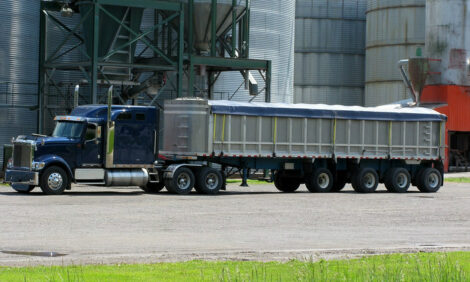



DMV/1639 now the focus of many IBV control programs in US flocks
Variants of infectious bronchitis virus (IBV) affecting broiler flocks differ regionally, but the strain causing the most concern lately appears to be Delmarva/1639 (DMV/1639), poultry veterinarians reported at a recent roundtable.David French, DVM, formerly with Sanderson Farms and now with the University of Georgia, said DMV/1639 was the biggest IBV issue at his company. “It caught me completely by surprise.”
French discovered DMV/1639 as he was trying to figure out why feed conversion was less than optimal among seemingly normal flocks in south Georgia. Upon necropsy, every bird examined had a 3+ airsacculitis score.
‘No flushing’
“At first, I thought it couldn’t be DMV/1639 since there was no flushing, but the virus had changed to more of a respiratory challenge. I think we just caught it early because mortality did start to pick up and got worse after about 35 to 40 days of age,” French said at the roundtable on “Infectious Bronchitis: Evolving Strategies for an Evolving Virus.”
DMV/1639 in Sanderson flocks was also isolated to a lesser extent in Mississippi, where the Georgia 08 variant is more prominent, he said, noting that generally speaking, the IBV Arkansas variant is a “nagging problem.”
Since there wasn’t an autogenous vaccine to combat DVM/1639, “we went with the quickest way we could find to solve the problem,” which was aiming for some cross-protection with an IBV Georgia 08 vaccine. “And I have to say, it’s been a very effective response. The control we’ve gotten using that vaccine has been very good. The short-term benefits are great. I’m a little concerned about the long-term effects…” he said.
Mark Burleson, DVM, of Wayne Farms, said his company has flocks throughout the Southeast from Arkansas to North Carolina and all states in between. He has encountered variants Georgia 08 and Georgia 13, and DMV/1639 has been isolated only in Alabama and Arkansas. The approach to control has been similar to that used by Sanderson, though Burleson noted his experience with DMV/1639 so far has been limited.
3- to 4-year struggle
Meagan Slater, DVM, Mountaire Farms, said flocks on the Delmarva shore have experienced “quite a bit” of bronchitis, and it’s been a struggle to control DMV/1639 for the last 3 or more years. She also encountered DMV/1639 when she worked as a consultant in Pennsylvania. “We saw the impact on feed conversion and some airsacculitis.”
Besides DMV/1639, Mountaire has isolated Georgia 08 in Delmarva flocks and the Georgia 13 variant in North Carolina, she said.
Brian Ladman, PhD, University of Delaware, said it’s a misnomer that the variant DMV/1639 is named after the Delmarva region because it likely originated from a virus affecting layers in nearby Pennsylvania. Initially it didn’t cause too many problems, but around 2011, it presented as a nephropathogenic pathogen, subsided for a while, then “came back hard” in 2014.
Ladman was involved with development of a DMV/1639 vaccine that he said has yielded good results for some companies but not all. “Management is a factor,” he insisted. “At the start, it seemed to work very well. It was new and more attention was likely paid to ensure proper application. Once the novelty wears off, I think people fall into a routine; perhaps there are personnel changes, results change, who knows?”
Guillermo Zavala, DVM, PhD, founder of Avian Health International and an adjunct professor, University of Georgia, said DMV/1639 has also emerged in layer flocks in northeast Georgia.
“We’re seeing the very first cases that are possibly DMV/1639,” he reported. “They already have a number of flocks with cystic oviducts and false layers. Birds are peaking at 70%, where they normally peak at 96%.”
Shifting landscape
Despite the emergence of new variants, French and Burleson said overall, they wouldn’t say there’s an increase in problems with IBV and that it’s more of a “shifting landscape.”
“There is a seasonal aspect to bronchitis,” Burleson said. “Generally, based on my experience, summer is always better, and winter and spring tend to be the worst. However, if significant respiratory diseases pop up, it’s typically due to a new variant IBV.”
Although IBV variants are problematic, he considers them to be mild viruses unless there are confounding factors such as the use or misuse of aggressive respiratory vaccines, poor ventilation or farm managements issues, which lead to more clinical disease.
French added, “There are definitely some outside circumstances that affect respiratory challenge,” such as Escherichia coli, which can be a bacterial infection secondary to IBV or a primary pathogen.
Problem for processing
Burleson added, “I think [IBV alone is] more of an issue at the plant than in the field” because a problem may not become apparent until the plant calls to say line speeds are slowed or down due to airsacculitis.
Sarah Tilley, DVM, Fieldale Farms, agreed. Based on her experience with the IBV variant Georgia 13, she didn’t see a huge increase in mortality, but the processing plant complained about airsacculitis. The Georgia 13 problem was resolved after the company produced serials of a Georgia 13 vaccine, which were used on and off for 3 or 4 years until surveillance indicated the virus was no longer a challenge.
“It worked wonderfully. It worked beautifully. It was like turning on a light switch,” she said.










